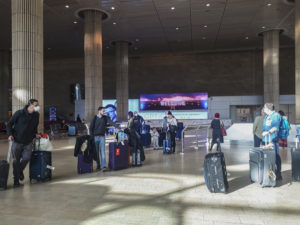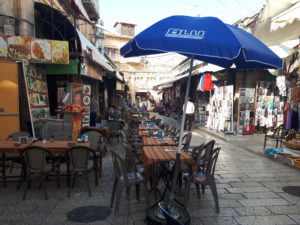Thousands of hotel, airport workers sent on unpaid leave as tourism comes crashing down
Weary travelers trickled into Israel’s Ben-Gurion Airport arrivals hall this week, their expressions bleak and their voices hushed. Many wore masks as they hurried to the exits and home for a 14-day self-quarantine, in line with Health Ministry guidelines.
A lone couple holding a shimmering, heart-shaped balloon stood nearby, waiting for a loved one to make it past customs. Normally bustling with activity and boisterous family reunions, the arrivals hall was all but empty as the flight status board announced cancellation after cancellation.

Travelers arrive in Israel at Ben-Gurion Airport on March 11.
In the departures hall, the sense of desolation was even more pronounced: Check-in desks stood abandoned, and no lines were to be seen.
Most airline workers had been sent home on unpaid leave, like thousands of other workers across Israel who were laid off as businesses went into crisis mode in light of unprecedented measures intended to combat the spread of coronavirus, also known as COVID-19.
Earlier in the week, the Health Ministry decided that all Israelis returning from travels abroad had to self-quarantine for 14 days in order to stop the spread of the virus. Foreigners, meanwhile, were banned from entering the country entirely unless they could prove they had a place to stay in isolation.
“Right now, we’ve frozen all of our international flights, so it’s only domestic,” Nir Dagan, president and CEO of Arkia Airlines, told The Media Line. “Domestic is active and we hope to keep it this way.”
According to Dagan, the company is losing hundreds of thousands of dollars each day as a result of the pandemic, and has decided to lay off the majority of its staff.
“The aim is to reach a number of people that resembles 30% of our total manpower, meaning 70% of the company will be on unpaid leave,” Dagan said. “The [goal] is to stay alive through the crisis and be ready for a quick recovery when it comes.”
In light of the new regulations, El Al Israeli Airlines decided to cut 80% of its workforce, amounting to some 5,000 employees being sent home. The company reported that it was expecting losses of up to $160 million for January through April.
More than 100 Israelis – including an airport worker – have so far tested positive for COVID-19, and hundreds of thousands more are under quarantine. On Wednesday, the government ruled that gatherings of over 100 people would be banned for at least the next two weeks.
Hotels to send home 80% of workers
Up until March, Israel had been experiencing a record-breaking year in tourism and was set to surpass 2019, which saw 4.6 million people visit the country. But as the Health Ministry’s guidelines took effect, hotels began to empty out. Many are now almost entirely vacant.
Arie Sommer, director-general of the Jerusalem Hotel Association, told The Media Line that the tourism industry was reeling.
“We believe that some 80% of employees at all hotels in Jerusalem, and I think around the country too, are going to go home, unfortunately,” Sommer stated. “What we’re trying to do is cut down all of the expenses in hotels. Some… are closing down for at least a few months.”
Sommer estimates that Israel’s tourism industry will lose $400 million over the next three months.
“For the time being, this is really the end of tourism to Israel,” he said.
Tour operators are also downsizing as their main source of revenue dries up.
“Yesterday, we were forced to make a very difficult decision, to cut all of our workers’ hours in half,” Re’em Raizner, CEO of Shin Luxury Tours, told The Media Line. “Many other tour companies in the area fired their staff, but we decided that that’s the last thing we want to do.”
Shin Luxury Tours, whose main market is the United States, has decided to reinvent itself, according to Raizner. He revealed that the company was turning to virtual tourism to keep the business afloat, and would be launching interactive “online travel” packages for Americans stuck at home.
Restaurants, shops in ‘critical’ condition
The coronavirus effect has spilled over into other business sectors as well.
During lunch hour on a sunny afternoon this week, the Focaccia Bar restaurant in downtown Jerusalem – normally a popular choice for locals and visitors alike – stood completely empty as servers waited for clients.
“The situation right now is really critical,” David, one of the owners, told The Media Line. “We’re receiving reservation cancellations non-stop. There are no tourists, and even the locals are afraid to come here. I estimate that we’ve lost over 50% of our customers.”

Restaurants in Jerusalem’s Old City, which relies heavily on tourists, stand empty.
Taxi drivers in the city center also complained of a major slowdown as many Israelis choose to stay at home for fear of contracting COVID-19.
“If you look outside along the streets, taxis are just waiting around for clients,” Yaron Eliezer, a driver, said to The Media Line. “We’re in downtown Jerusalem and there are no people out. On top of this, you can also see that all the restaurants and shops are empty. Everyone is standing around and waiting to see what happens.”
Meanwhile, the non-profit sector, which strongly relies on volunteers and donations, is not faring much better.
Leket, Israel’s largest food rescue organization, feeds 175,000 people every week and works with 200 agencies all over the country. So far, it has lost 1,200 volunteers.
“Overall, we’re seeing about 150,000 shekels ($41,000) worth of funds that were supposed to come in only this month and that we’re going to lose,” Gidi Kroch, CEO of Leket, told The Media Line. “Something has to be done. We can’t stop feeding the people. Nourishment is required. We won’t survive without that.”
Despite these hardships, authorities remain optimistic that the storm will pass and that Israel will emerge on the other side, sturdier than before.
“The fact that the government of Israel is very tough… in the way we are dealing with the corona situation is actually gaining other nations’ respect,” Ilanit Melchior, director of tourism at the Jerusalem Municipality, asserted to The Media Line. “Once the flights come back, I think the recovery will be much faster. We will be there, prepared with our marketing plan.”
On Wednesday, Israeli Prime Minister Binyamin Netanyahu announced that the state would allocate $2.8 billion dollars to help mitigate the economic fallout. However, the full impact of the pandemic remains to be determined, and many businesses say that financial aid cannot arrive quickly enough.

The Western Wall, in Jerusalem’s Old City – normally filled with worshippers – is now seeing much lower attendance. This photo was taken on March 10.
“[The government] needs to do more, and much more quickly. Otherwise, by the time they make a decision, it might be too late,” Arkia’s Dagan cautioned.
He believes, however, that the country will ultimately overcome the crisis.
“The world is spinning,” he said, “and we keep on going.”